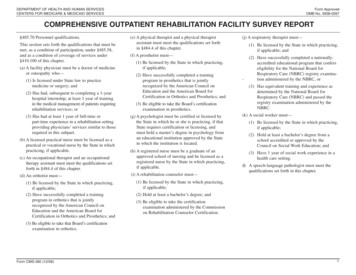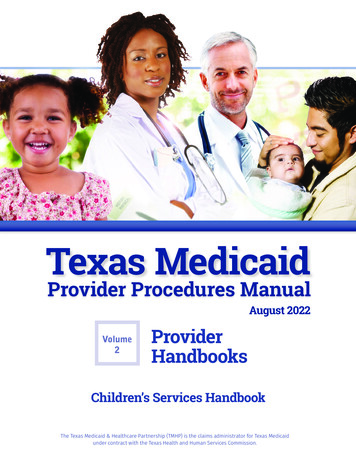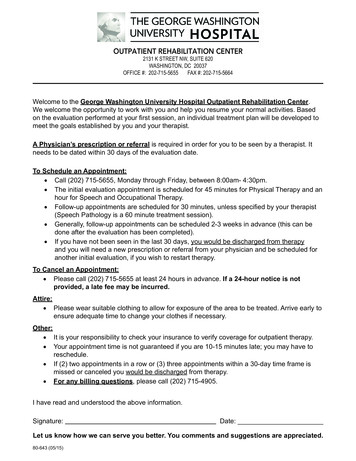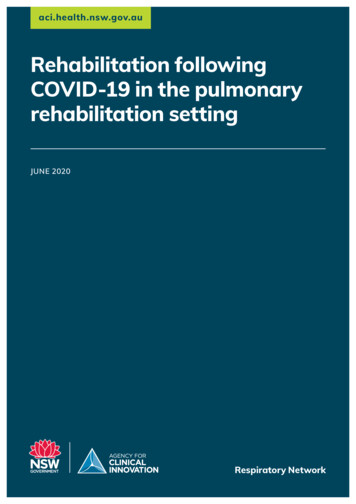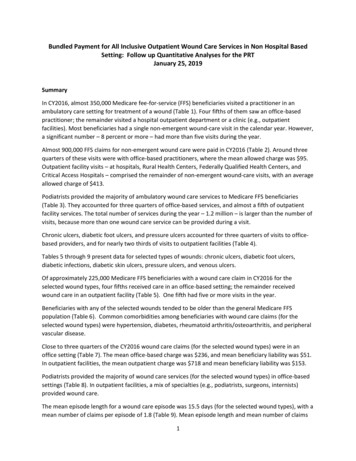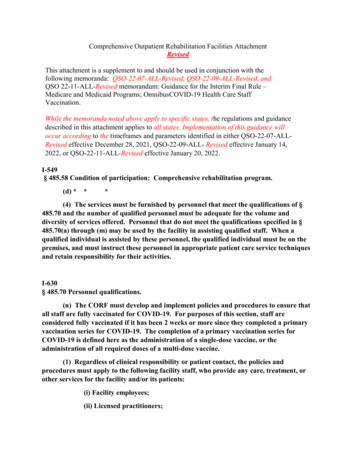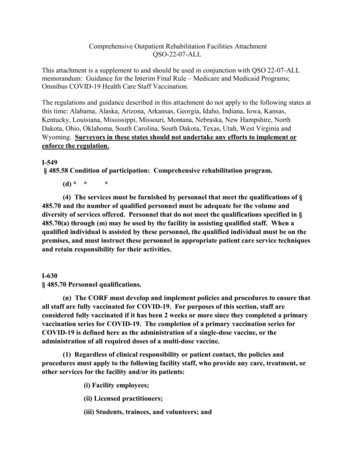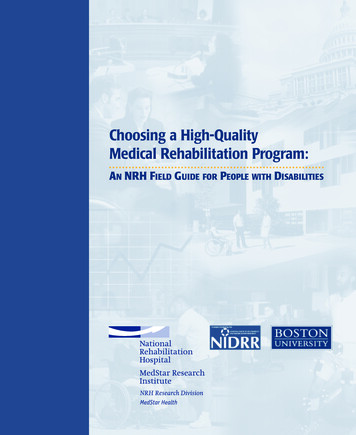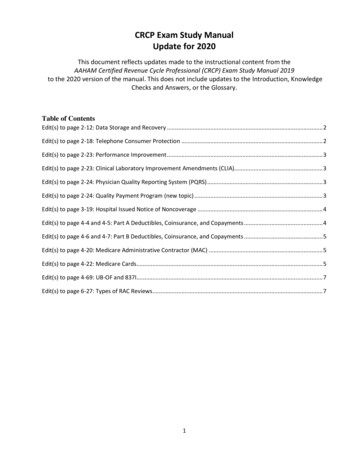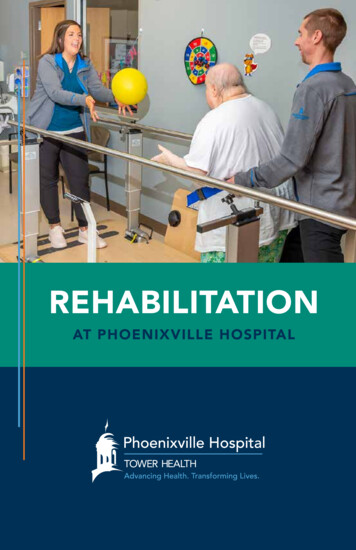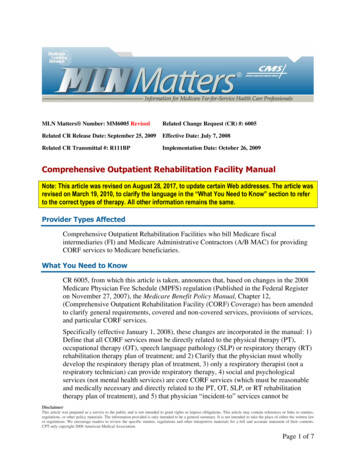
Transcription
MLN Matters Number: MM6005 RevisedRelated Change Request (CR) #: 6005Related CR Release Date: September 25, 2009Effective Date: July 7, 2008Related CR Transmittal #: R111BPImplementation Date: October 26, 2009Comprehensive Outpatient Rehabilitation Facility ManualNote: This article was revised on August 28, 2017, to update certain Web addresses. The article wasrevised on March 19, 2010, to clarify the language in the “What You Need to Know” section to referto the correct types of therapy. All other information remains the same.Provider Types AffectedComprehensive Outpatient Rehabilitation Facilities who bill Medicare fiscalintermediaries (FI) and Medicare Administrative Contractors (A/B MAC) for providingCORF services to Medicare beneficiaries.What You Need to KnowCR 6005, from which this article is taken, announces that, based on changes in the 2008Medicare Physician Fee Schedule (MPFS) regulation (Published in the Federal Registeron November 27, 2007), the Medicare Benefit Policy Manual, Chapter 12,(Comprehensive Outpatient Rehabilitation Facility (CORF) Coverage) has been amendedto clarify general requirements, covered and non-covered services, provisions of services,and particular CORF services.Specifically (effective January 1, 2008), these changes are incorporated in the manual: 1)Define that all CORF services must be directly related to the physical therapy (PT),occupational therapy (OT), speech language pathology (SLP) or respiratory therapy (RT)rehabilitation therapy plan of treatment; and 2) Clarify that the physician must whollydevelop the respiratory therapy plan of treatment, 3) only a respiratory therapist (not arespiratory technician) can provide respiratory therapy, 4) social and psychologicalservices (not mental health services) are core CORF services (which must be reasonableand medically necessary and directly related to the PT, OT, SLP, or RT rehabilitationtherapy plan of treatment), and 5) that physician “incident-to” services cannot beDisclaimerThis article was prepared as a service to the public and is not intended to grant rights or impose obligations. This article may contain references or links to statutes,regulations, or other policy materials. The information provided is only intended to be a general summary. It is not intended to take the place of either the written lawor regulations. We encourage readers to review the specific statutes, regulations and other interpretive materials for a full and accurate statement of their contents.CPT only copyright 2008 American Medical Association.Page 1 of 7
MLN Matters Number: MM6005Related Change Request Number: 6005provided in a CORF. Make sure that your billing staffs are aware of these CORF manualchanges.BackgroundCR 6005 announces that (effective January 1, 2008) the Medicare Benefit Policy Manual,Chapter 12 (Comprehensive Outpatient Rehabilitation Facility (CORF) Coverage) isamended to reflect changes announced in the 2008 MPFS regulation and to clarifygeneral requirements, covered and non-covered services, provisions of services, andspecific CORF services.Note: A CORF’s purpose is to permit the beneficiary to receivemultidisciplinary rehabilitation services at a single location in a coordinatedfashion. Section 1861 (cc) of the Social Security Act specifies that no servicemay be covered as a CORF service if it would not be covered as an inpatienthospital service when provided to a hospital patient. (This does not mean thatthe beneficiary must require a hospital level of care or meet otherrequirements unique to hospital care), but rather only that the service wouldbe covered if provided in a hospital. The requirement for CORF outpatientmental health limitation is deleted.The policy changes that CR 6005 announces are synthesized below. CORF services are covered only if they are medically necessary and relate directly tothe rehabilitation of injured, disabled, or sick patients.Required ServicesThe CORF must provide these core services: a) CORF physicians’ services, b)physical therapy services, and c) social and psychological services.1. CORF physician services are those physician-performed professional services thatare administrative in nature; such as consultation with, and medical supervision of,non-physician staff; patient case review conferences; utilization review; the review ofthe therapy/pathology plan of treatment, as appropriate; and other facility medical andadministration activities necessary to provide skilled rehabilitation services (thosethat PTs, OTs, SLPs and RTs provide), and other services that directly relate to therehabilitation plan of treatment.Please be aware that diagnostic or therapeutic services that a CORF (or other)physician provides to a CORF patient are NOT CORF physician services. Theseservices are separately payable to the physician under the MPFS, at the non-facilitypayment amount billed as if provided in the physician’s office.Remember that to become a CORF patient, a beneficiary must be under the care of aphysician who certifies that he/she needs skilled rehabilitation services. If thereferring physician does not specify the rehabilitation goals for PT, OT, SLP, or RTDisclaimerThis article was prepared as a service to the public and is not intended to grant rights or impose obligations. This article may contain references orlinks to statutes, regulations, or other policy materials. The information provided is only intended to be a general summary. It is not intended totake the place of either the written law or regulations. We encourage readers to review the specific statutes, regulations and other interpretivematerials for a full and accurate statement of their contents. CPT only copyright 2008 American Medical Association.Page 2 of 7
MLN Matters Number: MM6005Related Change Request Number: 6005services, the CORF physician must established them. Further, either the referringphysician or the CORF physician must establish, and sign, a rehabilitation plan oftreatment prior to the beginning treatment.In addition, the CORF physician or the referring physician, must review the treatmentplan for respiratory therapy services at least every 60 days; and for physical therapy,occupational therapy, speech-language pathology, and for all other services at leastonce every 90 days; certifying that the plan is being followed and that the patient ismaking progress in attaining the established rehabilitation goals.Note: The CORF physician must be present in the facility enough to ensure thatCORF services are provided in accordance with accepted principles of medicalpractice, medical direction, and medical supervision.2. Physical therapy services should comprise a clear majority of the total CORFservices. To supervise CORF physical therapy services, the physical therapist mustbe on the CORF premises (or must be available to the physical therapy assistantthrough direct telecommunications for consultation and assistance) during theCORF’s operating hours.3. Social and psychological services are covered only if the patient’s physician (orCORF physician) establishes that the services directly relate to the patients'rehabilitation plan of treatment and are needed to obtain the rehabilitation goals.Social and psychological services include only those services that address thepatient’s response and adjustment to the rehabilitation treatment plan; rate ofimprovement and progress towards the rehabilitation goals; or other services as theydirectly relate to the physical therapy, occupational therapy, speech-languagepathology, or respiratory plan of treatment.Notes: 1) CORF social and psychological services are the same, whetherprovided by either a qualified social worker or psychologist. Qualifications forindividuals providing CORF social and psychological services are a Bachelor’sof Science for social workers and a Masters-level degree for psychologist; 2)Social and psychological services do not include services for mental healthdiagnoses.Optional ServicesIn addition to the above three required core services, the CORF may also furnish thefollowing other covered and medically necessary items and services; as long as theydirectly relate to, and are consistent with, the rehabilitation treatment plan, and arenecessary to achieve the rehabilitation goals.1. Occupational therapy services;2. Speech - language pathology services;3. Respiratory therapy services include only those services that a qualifiedrespiratory therapist can appropriately provide to CORF patients under a physicianDisclaimerThis article was prepared as a service to the public and is not intended to grant rights or impose obligations. This article may contain references orlinks to statutes, regulations, or other policy materials. The information provided is only intended to be a general summary. It is not intended totake the place of either the written law or regulations. We encourage readers to review the specific statutes, regulations and other interpretivematerials for a full and accurate statement of their contents. CPT only copyright 2008 American Medical Association.Page 3 of 7
MLN Matters Number: MM6005Related Change Request Number: 6005established respiratory therapy plan of treatment, in accordance with currentmedical and clinical standards.These services include the physiological monitoring necessary to furnish them, andrather than paid separately, the payment is bundled into the payment for respiratorytherapy services. Diagnostic and other medical services provided in the CORF settingare NOT considered CORF services, and therefore may NOT be included in arespiratory therapy plan of treatment because these are covered under separate benefitcategories.Please take note that services performed by respiratory therapy technicians are NOTcovered because the current medical standards for skilled respiratory therapy servicesprovided to patients in the CORF setting require the educational requirements ofrespiratory therapists.Examples of specific RT CORF services include the respiratory therapist assessing thepatient to determine the appropriateness of pursed lip breathing activity and checkingthe patient’s oxygen saturation level (via pulse oximetry). If appropriate, therespiratory therapist may then provide the initial training in order to ensure that thepatient can accurately perform this activity; and again check the patient’s oxygensaturation level, or perform peak respiratory flow, or other respiratory parameters.These types of services are considered “physiological monitoring” and are bundled intothe payment for Healthcare Common Procedure Coding System (HCPCS) codes G0237(Therapeutic procedures to increase strength or endurance of respiratory muscles, faceto face, one on one, each 15 minutes (includes monitoring)), G0238 Therapeuticprocedures to improve respiratory function, other than described by G0237, one on one,face to face, per 15 minutes (includes monitoring)), and G0239 (Therapeutic proceduresto improve respiratory function or increase strength or endurance of respiratorymuscles, two or more individuals (includes monitoring)).Another example of monitoring includes the provision of a 6-minute walk test that istypically conducted before the start of the patient’s respiratory therapy activities, andthe time to provide this walk “test” assessment can be included as part of the HCPCScode G0238.Note: Instructing a patient in the use of equipment, breathing exercises, etc. maybe considered reasonable and necessary to the treatment of the patient’s conditionand can usually be given to a patient during the course of treatment by any of thehealth personnel involved therein, e.g., physician, nurse, respiratory therapist.4. Prosthetic and orthotic devices are covered, including the testing, fitting, or training intheir use;5.Nursing services (which must be provided by an individual meeting the qualificationsof a registered nurse (RN), rather than a licensed practical nurse (LPN)) are provided asan adjunct to the rehabilitation treatment plan of treatment, and must be reasonable andDisclaimerThis article was prepared as a service to the public and is not intended to grant rights or impose obligations. This article may contain references orlinks to statutes, regulations, or other policy materials. The information provided is only intended to be a general summary. It is not intended totake the place of either the written law or regulations. We encourage readers to review the specific statutes, regulations and other interpretivematerials for a full and accurate statement of their contents. CPT only copyright 2008 American Medical Association.Page 4 of 7
MLN Matters Number: MM6005Related Change Request Number: 6005medically necessary. For example, a registered nurse may perform (including patientinstruction): the proper procedure of “in and out” urethral catheterization,tracheostomy tube suctioning, or the cleaning for ileostomy or colostomy bags.Note: Nursing services may not be a substitute for or supplant the services ofphysical therapists, occupational therapists, speech-language pathologist andrespiratory therapists, but instead must lend support to or further therehabilitation services and goals.6. CORFs can provide pneumococcal, influenza, and hepatitis B vaccines to itspatients provided the facility is “primarily engaged in providing (by or under thesupervision of a physician) restorative services to outpatients for the rehabilitation ofinjured, disabled, or sick persons.”Note: Because no drugs and biologicals are currently identified as appropriate toa therapy rehabilitation treatment plan, CORFs may not submit claims for drugsand biologicals.7. Supplies and Durable Medical Equipment (DME) – CORFs may not bill for thesupplies they furnish except for those cast and splint supplies that are used inconjunction with the corresponding Current Procedural Terminology code in the29XXX series;8. Physical therapy, occupational therapy, and speech-language pathology servicesmay be furnished in the patient’s home, as CORF services, when payment for thesetherapy services is not otherwise made under the Medicare home health benefit; and9. A single home PT, OT, or SLP environment evaluation visit, which includesevaluating the potential impact of the home environment on the rehabilitation goals, islimited to the services that one professional (who must be either a PT, OT, or SLP, asappropriate) provides, when the corresponding treatment plan identifies the homeenvironment evaluation as necessary. The patient must be present during the homeenvironment evaluation visit.Note: When, in addition to the required physical therapy, a CORF provides OT,SLP and/or RT services; the physical therapy services must represent thepredominate rehabilitation service.Note: Hyperbaric oxygen services, infusion therapy services, cardiac rehabilitationservices, or diagnostic sleep studies are not considered CORF services becausethey do not meet the definition, nor do they relate to the rehabilitation treatmentplan. These, and other services not specifically listed as CORF services, may becovered under other Medicare benefits categories, such as physician services anddiagnostic services.DisclaimerThis article was prepared as a service to the public and is not intended to grant rights or impose obligations. This article may contain references orlinks to statutes, regulations, or other policy materials. The information provided is only intended to be a general summary. It is not intended totake the place of either the written law or regulations. We encourage readers to review the specific statutes, regulations and other interpretivematerials for a full and accurate statement of their contents. CPT only copyright 2008 American Medical Association.Page 5 of 7
MLN Matters Number: MM6005Related Change Request Number: 6005Payment RulesThe payment basis for CORF services is 80% of the lesser of: 1) the actual charge for theservices; or 2) the MPFS amount for the service, when the MPFS establishes a paymentamount for such service. Payment for CORF services under the PFS is made for allCORF services (PT, OT, SLP, RT, and the related nursing and social and psychologicalservices); which are part of, or relate directly to, the rehabilitation treatment plan.If there is no fee schedule amount for a covered CORF item or service, payment is basedon the lesser of 80% of actual charges for the services provided or the amount determinedby the local Medicare contractor.Payment for covered DME, orthotic and prosthetic devices and supplies that a CORFprovides is based on the lesser of 80% of actual charges; or the payment amountestablished under the DMEPOS fee schedule, or the single payment amount establishedunder the DMEPOS competitive bidding program (provided that payment for such anitem is not included in the payment amount for other CORF services).Payment for CORF social and psychological services is made under the MPFS only forHCPCS Code G0409, as appropriate, only when billed using revenue codes 0560, 0569,0910, 0911, 0914 and 0919.Payment for CORF respiratory therapy services is made under the MPFS whenprovided by a respiratory therapist as defined at 42 CFR 485.70(j), only to the extent thatthese services support or are an adjunct to the rehabilitation plan of treatment, and onlywhen billed using revenue codes 0410, 0412 and 0419. When provided as part of a CORFrespiratory therapy rehabilitation treatment plan, separate payment is not made fordiagnostic tests or for services related to physiologic monitoring services; which arebundled into other therapy services appropriately performed by respiratory therapist, suchas HCPCS G-codes G0237, G0238, and G0239. These three HCPCS codes are specific toservices provided under the respiratory therapy plan of treatment and, as such, are notdesignated as subject to the therapy caps.CORF nursing services are paid under the MPFS for nursing services, but only whenprovided by a registered nurse, and only to the extent that these services support or are anadjunct to the rehabilitation services that PTs, OTs, SLPs, and RTs provide, and areconsistent with the rehabilitation treatment plan. In addition, payment for CORF nursingservices is made only when provided by a registered nurse, and coded with HCPCS codeG0128 (Direct (face-to-face with patient) skilled nursing services of a registered nurseprovided in a comprehensive outpatient rehabilitation facility, each per 10 minutesbeyond the first 5 minutes) is used to bill for these services, and only with revenue codesrevenue 0550 and 0559.Note: Services provided under the “incident to” benefit may not be recognized asCORF services. Services furnished by CORF personnel, including registered nurses,physical therapists, occupational therapists, speech-language pathologist andrespiratory therapists are not considered furnished incident-to physician services.DisclaimerThis article was prepared as a service to the public and is not intended to grant rights or impose obligations. This article may contain references orlinks to statutes, regulations, or other policy materials. The information provided is only intended to be a general summary. It is not intended totake the place of either the written law or regulations. We encourage readers to review the specific statutes, regulations and other interpretivematerials for a full and accurate statement of their contents. CPT only copyright 2008 American Medical Association.Page 6 of 7
MLN Matters Number: MM6005Related Change Request Number: 6005Payment for covered pneumococcal, influenza, and hepatitis B vaccines provided inthe CORF setting is based on 95% of the average wholesale price. The registered nurseprovides administration of the vaccines using CPT code 90471. Finally, CR 6005 announces that the requirement for CORF outpatient mental healthtreatment limitation is deleted.Additional InformationThis article only summarizes the CORF manual revision made by CR 6005 and you canfind the complete details by reviewing CR 6005, located nce/Transmittals/downloads/R111BP.pdf on the CMS website. Youwill find the updated Medicare Benefit Policy Manual, Chapter 12, (ComprehensiveOutpatient Rehabilitation Facility (CORF) Coverage), as an attachment to CR 6005.In addition, for specific payment requirements for CORF, items and services, see theMedicare Claims Processing Manual, Chapter 5 (Part B Outpatient Rehabilitation andCORF/OPT Services), which you can find at e/Manuals/downloads/clm104c05.pdf on the CMS website.If you have any questions, please contact your FI or A/B MAC at their toll-free number,which may be found at active-map/index.html on theCMS website.DisclaimerThis article was prepared as a service to the public and is not intended to grant rights or impose obligations. This article may contain references orlinks to statutes, regulations, or other policy materials. The information provided is only intended to be a general summary. It is not intended totake the place of either the written law or regulations. We encourage readers to review the specific statutes, regulations and other interpretivematerials for a full and accurate statement of their contents. CPT only copyright 2008 American Medical Association.Page 7 of 7
Comprehensive Outpatient Rehabilitation Facilities who bill Medicare fiscal intermediaries (FI) and Medicare Administrative Contractors (A/B MAC) for providing CORF services to Medicare beneficiaries. What You Need to Know . CR 6005, from which this article is taken, announces that, based on changes in the 2008
